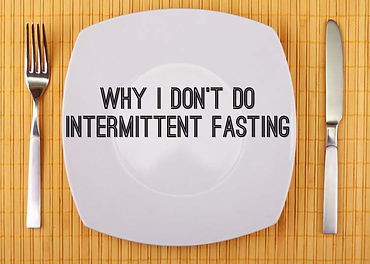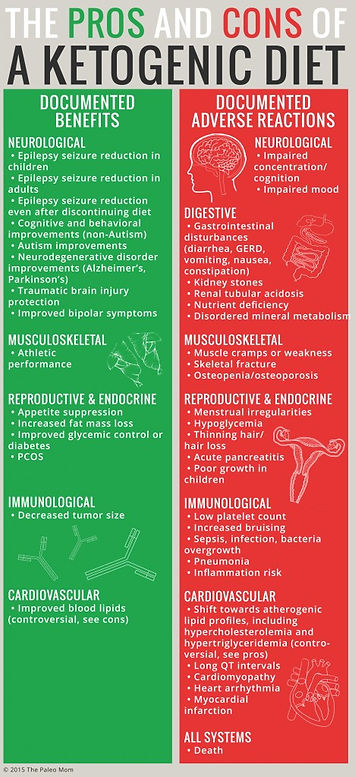
Intermittent Fasting - my views


KETO DIET

I have had many people ask me about Intermittent Fasting and because there is so much confusion out there, wanted to let you know my views on this and why I I'm not a fan.
Do you remember that last time you were ill and lost your appetite so may not have eaten for days. Then the moment you started feeling better, ate for gold with ravenous hunger? This is the body's survival mechanism that cater's for famine. Same too happens with an intentionally fast.
NEGATIVE IMPACTS OF FASTING -
-
HUNGER - obviously if you do not eat, you will get hungry, this will cause you to over eat when you do come to eat. This also exacerbates bingeing and eating disorders, not to mention an unhealthy obsession with food as you will always be thinking about it and can be tempted easily.
-
CRAVINGS - cravings start due to hunger especially for quick fix starchy, sugary and fatty foods all calorie dense. Your will power is much reduced and thus the risk of eating allergens such as wheat, gluten and dairy are much higher. This leads to more inflammation, disease and weight/fat gain.
-
LOSS OF MUSCLE - if you are not giving your body protein, it will lose it.
-
LOSS OF NUTRIENTS - again, if you do not give your body nutrients, how will it get them?
-
NO FIBRE - slows the bowels and can cause constipation. Plus there is nothing to bind toxins as they are liberated or encountered through the environment/air.
-
WATER LOSS not FAT LOSS.
-
IRRITABILITY & MOOD SWINGS - due to low blood sugar.
-
STARVATION MODE - your body will want to store fat once you start eating again. Also see hunger.
-
INCREASE CORTISOL - again, your body thinks it is starving and will raise stress hormones to cater for no food coming in. This adds to adrenal fatigue and low energy plus deposition of fat around the belly when you do eat.
-
LOW ENERGY - fatigue from lack of food and nutrients can mean you are not motivated to exercise (especially fat burning cardio). You just feel like crashing.
-
HEADACHES - due to low blood sugar and detoxification effects.
-
LOSS OF ELECTROLYTES - it is super important to drink loads of water whilst fasting thus flushing out important electrolytes and nutrients. This can lead to more fatigue and dizziness.
-
INSOMNIA - due to higher levels of cortisol you can find it hard to sleep. Not only does this disrupt your down time, repair and energy, it also reduces your opportunity for growth hormone production thus reducing fat burning and muscle building. In addition, lack of sleep leads to hunger which accelerates the hunger-binge cycle.
-
SLOWED METABOLISM - slowing thyroid (especially not ideal for those with thyroid disorders) and metabolism means slower rate of fat burning.
-
EXPOSE TO TOXINS - high exposure to toxins with no nutrients or proteins, to aid detoxification pathways in the liver or gut, overwhelm the system and induce toxicity and detox symptoms that cause you more harm that good.
KETO - not for everyone
Keto is definitely not a 1 size fit's all approach. Many issues can arise and it is definitely not a long term solution.
Besides the fact that it is hard to sustain due to symptoms and practically implement, I have found it does not result in long term, sustained weight/fat loss. Instead it causes a slow metabolism, muscle loss and thyroid issues.
I have seen many diet's come and go over more than 2 decades of my career. When we go to drastic extremes with diets, whether it’s extremely low fat or, in the case of Keto, extremely low carb, it puts too much stress on the body and serious problems arise. When a diet like Keto sounds too good to be true, it probably is.
WHO SHOULD DEFINITELY AVOID KETO
One diet truly does not fit all, and Keto may not be the right fit for you. The high amount of fats required for your body to go into ketosis and extreme fat-burning are not right for everyone.
Especially avoid the Keto diet if you have any of these conditions:
-
THYROID ISSUES - Keto causes the thyroid to slow.
-
PANCREATITIS OR HIGH TRIGLYCERIDES - Keto causes an increase in circulating fats.
-
GALLBLADDER ISSUES OR REMOVAL - A high fat Keto diet can aggravate existing gallbladder disease. Issues with fat digestion arise causing weight gain, bloating, and other digestive discomforts.
-
LOW BLOOD PRESSURE - in the production of ketones, the body becomes more acidic. Prolonged low blood pressure combined with acidosis can lead to cardiac arrest.
-
KIDNEY ISSUES - The added stress of the diet on the kidneys may worsen existing disease.
-
NUTRIENT DEFICIENCIES or WEIGHT LOSS SURGERY - If you have poor nutritional status from either prolonged sickness or severe calorie restriction, Keto will stress them your body even further. If you’ve had gastric bypass or other weight loss surgery, these surgeries often digestion and limit absorption of nutrients.
-
LIVER OR ABDOMINAL TUMORS - Digestive and liver functioning or deficiency development can result from Keto.
-
LOW GASTRIC MOTILITY - If you already have impaired gut motility, bowel obstruction can result due to Keto's constipating nature.
-
GENETIC CONDITIONS - Several genetic disorders are known contraindications for the Keto diet.
Warm wishes,

Vicki Witt | Clinical Nutritionist | Holistic Coach | Reiki Master | Certified LEAP allergy therapist
Over 25 years of successfully helping you achieve optimal health and weight loss | vickiwittweightloss.com
About Vicki:
Vicki Witt is a Clinical Nutritionist, Holistic Health Coach, and Reiki Master. She has been practicing over 25 years and specializes in holistically customizing diet and lifestyle plans to each individual for weight loss and hormonal control. Her clientele often report they feel the best they have ever felt and wish they had started sooner. One of the USA and Australia's top Nutritionists, she has won multiple awards for her services in the industry.
Certified and Registered Nutritionist
